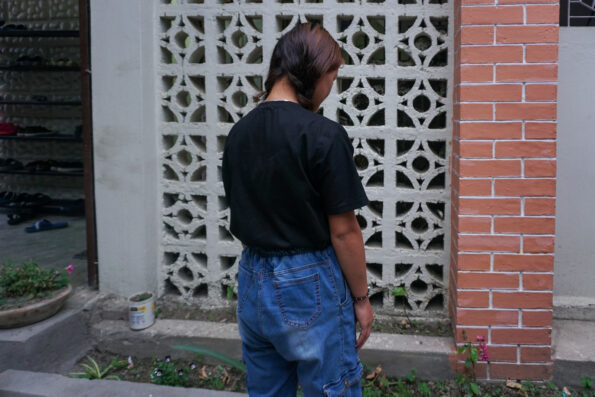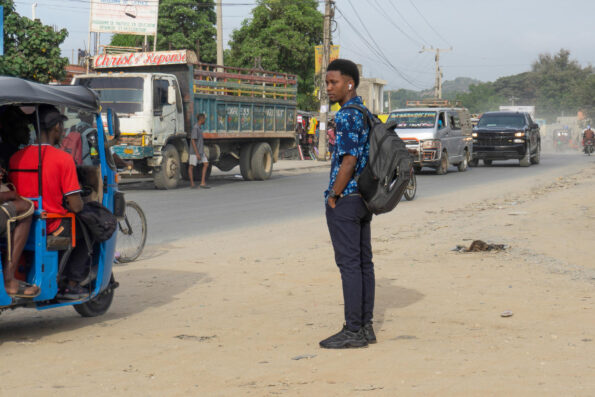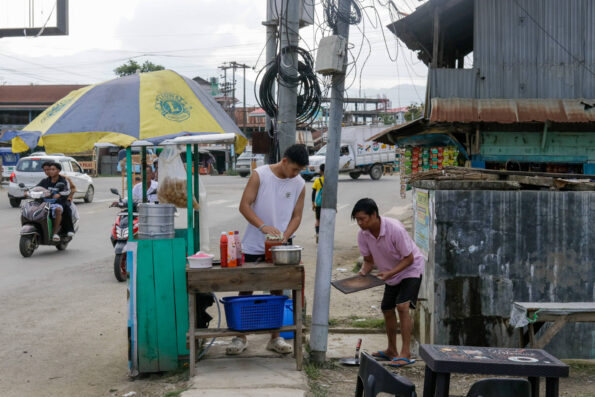
Mariam Esperence Aboubakar, GPJ DRC
Aline Rachari, 17, was kidnapped by members of the Nyatura armed group. Today, she lives in Goma, unable to return home because of the rape-related stigma attached to returned female child soldiers.
KALUNGU, DEMOCRATIC REPUBLIC OF CONGO — Aline Rachari, 17, knows that no one can really know what life will have in store for them, she says.
But she never imagined that her simple dream of finishing school and opening a business would be interrupted by abduction into an armed group, she says.
“I dreamed of becoming a businesswoman after my studies,” Rachari says.
In 2016, with her future business in mind, one day she and five friends were walking to a local market to sell their beans, when they were approached by a group of young men. When they were abducted and forced to go deep in the hills surrounding Numbi, some 25 kilometers (16 miles) from her home in Kalungu in DRC’s North Kivu province, she says they realized that the men were from a Nyatura armed group that is notoriously active in the area.
When they arrived in the hills, the girls’ role in the Nyatura armed group quickly became clear.
“Upon stepping into the bush, the rebel who had made me his prey forced me to take off my clothes,” Rachari says. “And my dream, which was to one day marry a man who I love, faded away.”
And so her new daily routine began. Every morning the girls would rise early to prepare meals, feed the soldiers and then have sex with as many of them as requested it.
“Every time during sex, I felt unbearable amounts of pain,” she says. “But I was paralyzed by fear that he would kill me, so I had to cry inside.”
It wasn’t long before the armed group expanded the girls’ role.
“We were forced to learn how to shoot handguns, whether we liked it, or not,” she says. “They said we had to know every skill they had.”
Always on the look out to escape, Rachari says she and her friend, Francine, found their moment nearly a year later when the group came under fire by Congolese government troops.
“We all made a dash for freedom. As we fled, bullets were flying all around us. Luckily, however, my friend Francine and I ended up being picked up by MONUSCO,” the UN peacekeeping mission in DRC, she says.
“Troops evacuated us, but the whereabouts of the other three girls remains a puzzle to me to this day,” she says.
Even though she is free from her captors, she says it’s not possible to return to her family in Kalungo.
“I’m sure my horrifying story of rape at hands of the Nyatura has spread like wildfire, and all my friends there know it,” Rachari says.
In DRC’s North Kivu province, thousands of children are abducted by armed groups each year. Even when rescued or released, young girls say their lives can never return to normal because the stigma of the abduction will prevent them from being welcomed back into their families, getting married or having families of their own.
For decades, eastern DRC has been home to politically and ethnically-motivated conflict.
Since 2013, more than 3,000 children have been released from armed groups, according to MONUSCO, the UN peacekeeping mission in DRC.
Many of these returned children don’t receive any relocation or integration services, says Eric Lunduge, data manager for Programme d’Appui à la Lutte contre la Misère, PAMI, a local nongovernmental organization active in the field of support to disarmament, demobilization and reintegration of children released from armed groups and forces.
But most children who receive services are boys, Lunduge says.
Just 43 girls were rescued from armed groups and received services in the 2016- 2017 fiscal year, Lunduge says.
Girls represent 30 to 40 percent of minors recruited and enlisted in armed groups, according to a 2017 report by Child Soldiers International, which surveyed eastern DRC in 2016.
Bienvenu Buhendwa, 39, a supervisor at PAMI, says awareness campaigns about how to reintegrate girls into their home communities with support and acceptance are critically important.
“Members of our community are inclined to believe that girls released from armed forces and groups deserve no better than neglect and rejection,” he says, citing their likely sexual abuse.
That was true for Vovo Mabiako, 28, who was left her role in the Congolese People’s Army in 2005 after nearly seven years of forced conscription.
“In the armed group there was only suffering,” she says. “They only taught me how to use weapons, kill, and fight, and to top it all off, I was just a sex object of commanders.”
In 2005 when the government began new efforts to end the use of children in armed forces, she says she was brought to Goma.
“We were offered seminars and training courses in sewing and tailoring, but my acquired skills are of no use to me today, because I don’t feel comfortable living here any longer,” she says, adding that the stigma of her experience is oppressive. “Men never stop talking behind my back, and I’m kind of a person that no one wants to be around. I’m afraid no one can ask for my hand in marriage.”
Despite the efforts by NGOs and government groups to offer services to young women returned home, the stigma they face in local communities remains the primary reason why reintegration is not possible, locals say.
“I can’t seek the hand of a girl who served in armed forces or groups,” says Fiston Kambale, 23. “Let’s assume, for example, that I chose to marry a girl having made a habit of killing, and that one day I do something to offend her in one way or another. She’ll most likely kill me.”
Even locals with a military background, who understand that these girls were taken against their will, often blame the girl.
For Dorcas Mwambuyi, 55, a military mother of 11, and former commander of women’s military company, it’s natural that girls face rejection when leaving armed groups. “Today, these girls are recruited into armed forces and groups at a very early age,” she says. “While in these armed groups, they aren’t treated like real soldiers. Very often they’re used as sex objects of commanders. They have no morals.”
Ndayaho Sylvestre, GPJ, translated the article from French.






